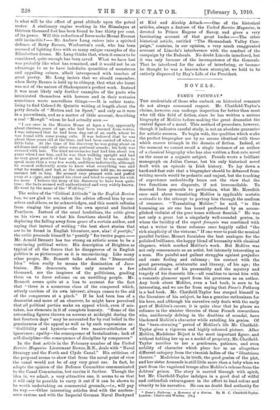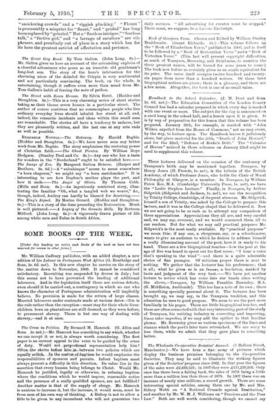NOVELS.
FAME'S PATHWAY.*
THE credentials of those who embark on historical romance do not always command respect. Mr. Chatfield-Taylor's claims, however, can undergo inspection far better than most who till this field of fiction, since he has written a serious biography of Moliere before making the great dramatist the central figure of a novel. This method of procedure, however, though it indicates careful study, is not an absolute guarantee for artistic success. To begin with, the qualities which make the perfect biographer are by no means identical with those which ensure triumph in the domain of fiction. Indeed, at the moment we cannot recall a single instance of an author of a classical biography who has also written a first-rate novel on the same or a cognate subject. Froude wrote a brilliant. monograph on Julius Caesar, but his only historical novel dealt with an episode in Irish history. To lay down a hard-and-fast rule that a biographer should be debarred from writing novels would be pedantic and unjust, but the teaching of experience undoubtedly bears out the view that the two functions are disparate, if not irreconcilable. To descend from generals to particulars, what Mr. Meredith once said about translating Moliere is applicable mutatis mutandis to the attempt to portray him through the medium of romance. "Translating Moliere," he said, "is like humming an air one has heard performed by an accom- plished violinist of the pure tones without flourish." He was not only a great but a singularly well-rounded genius, in whom the lucidity of the esprit francais was combined with what a writer in these columns once happily called "the rich simplicity of the virtuoso." If one were to push the musical parallel further, Mozart furnishes the best analogue for the polished brilliance, the happy blend of humanity with claisical elegance, which marked Moliere's work. But Moliere was not only consummate as an artist, but intensely interesting as a man. His painful and gallant struggles against prejudice and caste feeling and calumny ; his contact with the great personages, aristocratic and literary, of his age ; the admitted charm of his personality and the mystery and tragedy of his domestic life,—all combine to invest him with a romantic glamour apart from his greatness as an author. Any book about Moliere, even a bad book, is sure to be interesting, and we are far from saying that Fame's Pathway is a bad book. ,Mr. Chatfield-Taylor has steeped himself in the literature of his subject, he has a genuine enthusiasm for his hero, and although his narrative only deals with the early part of Moliere's career, it is quite clear that he places no reliance in the sinister theories of those French researchers who, assiduously delving in the dustbins of scandal, have blackened Moliere's char actor while extolling his genius. Of the " barn-storming " period of Moliere's life Mr. Chatfield- Taylor gives a vigorous and highly coloured picture. After Moliere, Madeleine Bejart is the most important figure, and without holding her up as a model of propriety, Mr. Chatfield- Taylor ascribes to her a gentleness, patience, and even nobility of character which, place her in an altogether different category from thelvixenish ladies of the "illustrious theatre." Madeleine is, in trait'', the good genius of the plot, and her sister Armande is still little more than a baby when we part from the vagabond troupe after Moliere's release from the debtors' prison. The story is carried through with spirit, but Mr. Chatfield-Taylor indulges in a good deal of wilful and outlandish extravagance in the effort to lend colour and vivacity to his narrative. He can no doubt find authority for • Fanto's PaUiwo,j a Romance of a Genius. By H. C. Chatfield-Taylor. London : Chatto and Windus. Les.1 " smickering crowds" and a " riggish plucking." " Flount " is presumably a misprint for "flaunt," and" grisled" has long been replaced by "grizzled." 'But a "footless intrigue," "footless talk," a "furtive girl;" and "a farrago of cavaliers" are vile phrases, and peculiarly out of place in a story which has for its hero the greatest satirist of affectation and pretence.











































 Previous page
Previous page